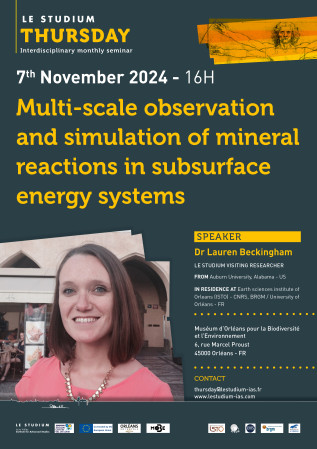Lauren Beckingham

From
Auburn University - US
In residence at
Earth sciences institute of Orleans (ISTO) - CNRS, BRGM, OSUC / University of Orléans - FR
Host scientist
Cyprien Soulaine
BIOGRAPHY
Lauren E. Beckingham is the W. Allen and Martha Reed Endowed Associate Professor and Associate Chair of the Department of Civil and Environmental Engineering at Auburn University. She holds a Ph.D. and M.A. in Civil and Environmental Engineering from Princeton University and a B.S. in Environmental Engineering from Michigan Technological University. Prior to joining Auburn, she was a Geochemical Postdoctoral Fellow at Lawrence Berkeley National Laboratory. Her expertise and interests are in environmental geochemistry, flow, and transport in subsurface energy systems. Much of her work has focused on understanding mineral reaction rates/reactive surface area and permeability evolution with implications for geologic CO2 storage and underground H2 storage.
PROJECT
Multi-scale observation and simulation of mineral reactions in subsurface energy systems
Subsurface geologic formations are critical in facilitating the energy transition to net zero. Such formations serve as storage reservoirs for anthropogenically produced CO2, radioactive waste from nuclear energy facilities, and renewable energy, in the form of H2 storage or geothermal energy generation. In such systems, mineral reactions can occur over a wide range of spatial (nm to km) and temporal (s to 100s of years) scales, impacting formation properties and the efficiency, risk, and environmental impact of such systems. Accurate understanding and prediction of mineral reactions in these systems is highly challenging due to the heterogenous nature of these systems but essential for site selection, risk assessment, and engineering design. The overall goal of this project is to enhance understanding and simulation of mineral precipitation reactions and reaction rates in porous media at the micro- to macro- scale to better understand and predict implications for geothermal, geologic CO2 sequestration, and subsurface H2 storage systems. This work will use a unique, multi-scale imaging, laboratory experimental, and simulation approach to enhance understanding of the mineral reactions in a range of heterogenous conditions. New observations of mineral reaction rates and changes in formation properties at the micro- to macro-scale will be made and leveraged to developed improved simulation and predictive capabilities of reactions in porous media. This work will yield unprecedented understanding and simulation of mineral reaction mechanisms and rates in diverse environments pertinent for subsurface energy systems.

